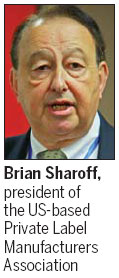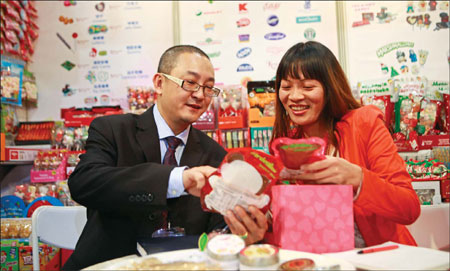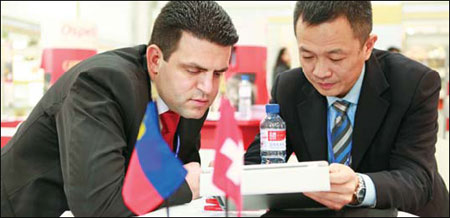The secret is out
Updated: 2013-01-11 09:43
By Yao Jing (China Daily)
|
|||||||||||
|
Visitors check out products at the annual Private Label Fair in Shanghai last month. Retailers in China have started to stock their shelves with more private label brands from Chinese manufacturers. Provided to China Daily |
|
Ozkan Gulbahar (left), sales director with Ospelt, is optimistic about his company's entry in the emerging markets. Provided to China Daily |
Chinese retailers are increasingly looking to sell private label products to gain an edge
Rene Pieter Bulthuis recently went hunting for razors and blades in Shanghai, despite being freshly shaven and couth. He spent all day in and out of stores, including Wal-Mart, Lotte Mart and Tesco, but couldn't find what he was looking for. Amid the fleet of Gillettes and big name brands, he was searching for something cheaper - that elusive private label.
Bulthuis is the CEO of Feintechnik, a German manufacturer of razors and blades, and like many executives of foreign manufacturers, he sees an opening for his products.
"Although the private label is still a little bit too early for the Chinese market, I have seen the opportunity of expanding my business in this marketplace," he says.
While private label products, which are manufactured or provided by one company for another company's brand and are generally cheaper in price, are popular among consumers in the United States, claims Deloitte, they have been slow to develop in China.
But retailers in China, where only foodstuffs are commonly sold under private labels, are branching into new product territory. They are starting to stock their shelves with more private label brands from Chinese manufacturers, who have begun to shift away from making cheap products for overseas retailers.
From January to September last year, China totaled 14.94 trillion yuan ($2.4 trillion; 1.84 trillion euros) in retail sales of consumer goods, according to the Ministry of Commerce. But total sales of private label brands have been miniscule since the Shanghai Kaikai Department Store introduced its own line of apparel in 1987.
"In China, private labels just account for less than 5 percent of all supermarket sales," says Brian Sharoff, president of the US-based Private Label Manufacturers Association.

In five European countries, including Spain, the United Kingdom and Germany, sales of private label products make up more than 40 percent of total sales at supermarkets. In the US, total sales of private labels in supermarkets came in at $59.9 billion (45.95 billion euros), according to the Nielsen Company, for the 52-week period ending Dec 24, 2011. That is an increase of $2.9 billion on the previous year.
"In Western countries, the economic recession has attracted new customers looking for cheaper prices and good quality. They are not just focusing on international brands," Sharoff says.
In emerging markets, however, consumers are still hunting for top brands and are not fully aware of private labels. That has opened a path for overseas retailers, manufacturers and suppliers.
Metro Cash and Carry, the German self-service wholesale retailer, has opened 50 stores in China since its first store in Shanghai in 1996. Seven years ago, it began offering more private label products in China.
Sharoff says that retailers who are looking to differentiate themselves from competitors and are aiming to build customer loyalty should venture out with private labels.
"We have developed six private label brands in our stores and sales (of private label products) now account for 14 percent of our total turnover, while profits from private label products are over 30 percent," says Yang Weixin, head of a management department at Metro Jinjiang Cash and Carry Co.
Metro Cash and Carry is aiming to ramp up private label offerings by 20 percent in less than five years. When it comes to choosing a supplier, Yang says they tend to work with overseas companies that produce foods, such as milk, that Chinese domestic producers have had a poor history of producing because of numerous food safety scandals.
"The reputation of imported goods is better compared with local manufacturers," Yang says.
Quality in products, Sharoff says, is key selling private label products, rather than a cheap price.
"They do not want goods that will not last long or taste good," he says.
Overseas retailers in these foods clearly have an advantage with their history and experience in selling safer foods but as Bulthuis explains, an understanding of the retail culture in China is also important.
"I have to learn the rules of retailers and know more about Chinese consumers," says Bulthuis, who says he will return to Shanghai in March.
Feintechnik has only one brand, called Croma, and 75 percent of its business comes from private label offerings. It is supplying 17 international retailers, such as Metro, as well as hypermarket chain Kaufland and supermarket corporation Edeka, both based in Germany.
"Although the turnover has doubled to 50 million euros ($65.2 million) from six years ago in Europe, it is slowing down in the mature markets. I am aiming at 30 percent of my business to be generated from China in the next 10 years," Bulthuis says.
In challenging Gillette, the famous razor manufacturer, he says his private label products are 20 percent cheaper.
"Private label products do not need marketing activities, and it is saving us some costs compared with promoting our own brand," he says.
Ospelt, a Liechtenstein-based pet food producer founded in 1958, whose customers includes Carrefour, Auchan, Proctor and Gamble and 60 other retailers in Europe, says it hopes to be the first overseas pet food maker of private label products in emerging markets.
"The average growth of the company's revenue is 10 percent year-on-year. The business is still there, but not satisfying anymore. We have a lot to do in emerging markets," says Ozkan Gulbahar, international sales director of Ospelt.
Although he says private labels are not well known in the pet food sector in China, and admits that the best way to enter a new market is with a brand name, he says big retailers' familiarity with his brand gives him an edge.
"Since Carrefour already know us, it was easier for us to march into the market with the Carrefour name," Gulbahar says.
Quality is another advantage for the confident producer.
"In the pet food industry, there are other quality standards in China. Our products do not use color or additives," he says.
But Gulbahar and Bulthuis will soon have to contend with Chinese manufacturers who previously made basic products mainly for exports at low prices, though the CEO of Feintechnik for the time being says he's not afraid of domestic competition.
"Talking about BMW, Porche and Audi, the label 'Made in Germany' always stands for quality," says Bulthuis. "At the end of the day, quality is the only thing that counts."
Still, domestic producers, who can save on the marketing and distributing costs that top brands have to endure as well as bypass tedious procedures for selling brandless products at big retailers, are closing in fast.
Xiamen Huli Fengyi Industry Trade Co Ltd has been making plastic food storage bags, cling wrap and aluminum foil for overseas retailers and distributors since it was established in 1996. In 2010, it began to work with local retailers, such as Rainbow and Yonghui Supermarket.
"The profit margin in domestic market is higher than in overseas markets because of the economic slowdown in Western countries," says Wu Peipei, a salesperson for the supermarket.
Wu says the prices of their export products are often just one-third compared with their overseas buyers' selling prices. Currently, overseas sales account for 70 percent of its turnover. The company has also registered two brands, Zipok and Wrapok, in China in 2010.
"But it is difficult to promote our own brands in the market because of the high admission fee, so we'd better operate the private label sector first," Wu says.
As for Nox-Bellcow (Zhongshan) Nonwoven Chemical Ltd, a non-woven fabric, cosmetics and anti-bacterial products producer that specializes in OEM and original design manufacturer services, its profit from the domestic market is 3 percent higher than from overseas orders.
"Overseas buyers are making comparisons among different factories around the world. The volume of the order is bigger than domestic ones, but the price is also forced down," says Fan Zhanhua, the company's deputy general manager.
Nox-Bellcow has OEM and ODM relationships with retailers around the world, including health and beauty retailer Watson's and Vinda Paper Group.
"Domestic sales account for 65 percent of the total business," Fan says.
Although it is considering its own brand, it is cautious because of the higher risk compared with just being a manufacturer.
"Running a brand often costs a lot of time and money. But we are not in charge of the promotion and marketing, and it is a much easier way for us," he says.
Fan admits that, as a manufacturer, quality is the key factor, especially considering the reputation of overseas competitors.
"The most painful thing for an ODM maker is that we spend a lot in researching, designing and manufacturing a product, but the product is not popular in the market. The order is terminated after the failure of the first order," Fan says.
Packaging is also important. If it is not attractive, customers will not buy it. And aggressive positioning - where to display private label products on store shelves - should also be taken into account, says Sharoff during the annual Private Label Fair held at the Shanghai Mart in December.
More than 220 exhibitors from 19 countries participated, including the US, Germany, France, Denmark, Italy and Turkey. Foreign exhibitors rented 25 percent of the show's booths.
yaojing@chinadaily.com.cn
(China Daily 01/11/2013 page12)
Today's Top News
Police continue manhunt for 2nd bombing suspect
H7N9 flu transmission studied
8% growth predicted for Q2
Nuke reactor gets foreign contract
First couple on Time's list of most influential
'Green' awareness levels drop in Beijing
Palace Museum spruces up
Trading channels 'need to broaden'
Hot Topics
Lunar probe , China growth forecasts, Emission rules get tougher, China seen through 'colored lens', International board,
Editor's Picks

|

|

|

|

|

|







